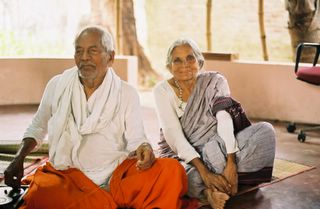Constructive Work: The Brick-Making Site (D. Willis)
We arrive at the brick-making site after a long bumpy trip along roads that could hardly be called more than bullock cart tracks, our driver Muttukumar deftly sliding through each pot-hole and head-on with another vehicle in a space of centimeters with precarious sides slipping off to a river, a thorn forest, a paddy field. He is, along with Gandhi – LAFTI’s secretary; Thamba – LAFTI’fs photographer; Kalyappan and Muniand – LAFTI’s chief accountants and office workers; and the wonderful cooks led by Jyothi and Mani, the heart of LAFTI’s operation.
The workers gather respectfully, knowing Amma has come and would have instructions, cajoling, and questions. Men, women, children. The adults seem to be from 20-35 and the children generally pre-school age. Amma is concerned about them baking in the heat, standing by their mothers and occasionally helping with the brick-making by kneading the clay or getting ready to fill a frame, always for two good-sized bricks, of which there are thousands drying in the sun.
This is a wasteland, or rather it is a tract of land that was left unused and has gone to thorn forest. These are particularly nasty thorns, having personal experience of them in the bottoms and side of my feet in previous time spent in Indian villages around Madurai. Not only can they give a piercing wound, some of them are tipped with poison that especially smarts. Not for the meek living in these conditions. Most of the workers, and of course the children, are barefoot. Dalits generally have a minimal amount of material possessions, maybe a few sets of old clothes, perhaps a set of sandals, some cooking pots and plates. Again, from personal experience, I can tell you that sandals do not provide much protection either, as the thorns easily go through any leather or rubber.
Three chairs are brought, one for Amma and the others for her guests. There are three of us, including myself, Sekar, and Ramuthai, a field development worker from the Gandhigram Trust, which is situated at Gandhigram Rural University, and who has been brought in to evaluate and consult. I realize in talking with her, and later with Amma, that I have actually known Amma and Appa earlier than David and I thought, as I had attended the opening of Gandhigram Rural University in December of 1976 and stayed with them at that time. And I have a memory of meeting them with Dick Keithan in Kodaikanal and perhaps at his ashram in Oddanachatram as well. I then visited Amma and Appa a number of times after that in their workers’ home, which I now realize was a branch of the early beginnings of LAFTI.
Ramuthai (Rama’s mother) is shining in her gold sari, an attractive woman whom I thought to be around 30 but who is actually 50 and already has grandchildren. We talk with her and her colleague Ramesh later about the problems of the rural poor. She has been involved in projects such as a World Bank-sponsored scheme for community-managed drinking water supply. Better to have them funding something on our side at least is the conclusion, not busy aiding the privatization of water.
Amma sits down, our composer and songster Murugaraj sings a brief song of encouragement to the workers, and Amma begins asking questions. She spends perhaps two-and-a-half hours talking with many of the workers, making it very clear to those who ask for boons (cows, lands, homes, etc) that she expects them to help themselves first and then, this is very important, to help others. Amma has the allegiance of tens of thousands of Dalit laborers in the countryside for maybe 50-60 kilometers in any direction. She can produce a demonstration of more than ten thousand in less than a day if necessary. And they have done that for the campaigns against prawn farming and the endless rounds of pressure for the release of lands to the poor.
The cell phone has come to India, too, leap-frogging the laborious and capital-intensive need for land-lines. Amma and Venugopu, from the next generation of leaders along with a gentleman we get to know later named Veerasamy, are often on the phone, the tune of an Italian opera loudly announcing each time a call comes in (“All around the cobbler’s bench, the monkey chased the weasel.”) (Note from David #1 – No. Most folks now think it was a song about spinning yarn, and there is some little evidence that it was known by the Pilgrims as early as 1620.)
The Other David


0 Comments:
Post a Comment
<< Home